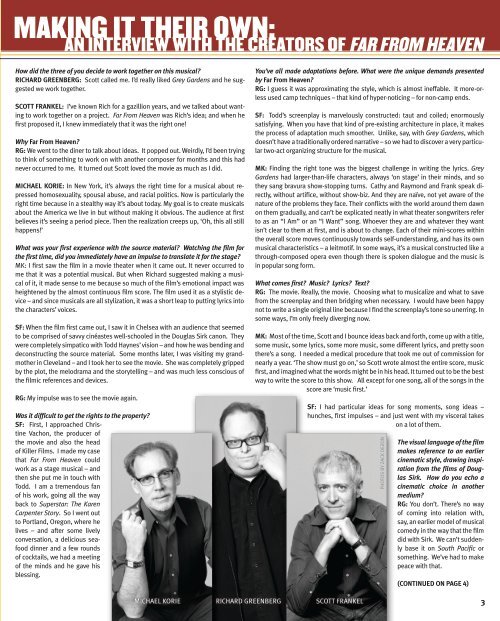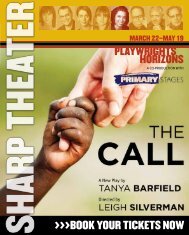pdf version - Playwrights Horizons
pdf version - Playwrights Horizons
pdf version - Playwrights Horizons
- No tags were found...
Create successful ePaper yourself
Turn your PDF publications into a flip-book with our unique Google optimized e-Paper software.
MAKING IT THEIR OWN:AN INTERVIEW WITH THE CREATORS OF FAR FROM HEAVENHow did the three of you decide to work together on this musical?RICHARD GREENBERG: Scott called me. I’d really liked Grey Gardens and he suggestedwe work together.SCOTT FRANKEL: I’ve known Rich for a gazillion years, and we talked about wantingto work together on a project. Far From Heaven was Rich’s idea; and when hefirst proposed it, I knew immediately that it was the right one!Why Far From Heaven?RG: We went to the diner to talk about ideas. It popped out. Weirdly, I’d been tryingto think of something to work on with another composer for months and this hadnever occurred to me. It turned out Scott loved the movie as much as I did.MICHAEL KORIE: In New York, it’s always the right time for a musical about repressedhomosexuality, spousal abuse, and racial politics. Now is particularly theright time because in a stealthy way it’s about today. My goal is to create musicalsabout the America we live in but without making it obvious. The audience at firstbelieves it’s seeing a period piece. Then the realization creeps up, ‘Oh, this all stillhappens!’What was your first experience with the source material? Watching the film forthe first time, did you immediately have an impulse to translate it for the stage?MK: I first saw the film in a movie theater when it came out. It never occurred tome that it was a potential musical. But when Richard suggested making a musicalof it, it made sense to me because so much of the film’s emotional impact washeightened by the almost continuous film score. The film used it as a stylistic device– and since musicals are all stylization, it was a short leap to putting lyrics intothe characters’ voices.SF: When the film first came out, I saw it in Chelsea with an audience that seemedto be comprised of savvy cinéastes well-schooled in the Douglas Sirk canon. Theywere completely simpatico with Todd Haynes’ vision – and how he was bending anddeconstructing the source material. Some months later, I was visiting my grandmotherin Cleveland – and I took her to see the movie. She was completely grippedby the plot, the melodrama and the storytelling – and was much less conscious ofthe filmic references and devices.RG: My impulse was to see the movie again.Was it difficult to get the rights to the property?SF: First, I approached ChristineVachon, the producer ofthe movie and also the headof Killer Films. I made my casethat Far From Heaven couldwork as a stage musical – andthen she put me in touch withTodd. I am a tremendous fanof his work, going all the wayback to Superstar: The KarenCarpenter Story. So I went outto Portland, Oregon, where helives – and after some livelyconversation, a delicious seafooddinner and a few roundsof cocktails, we had a meetingof the minds and he gave hisblessing.You’ve all made adaptations before. What were the unique demands presentedby Far From Heaven?RG: I guess it was approximating the style, which is almost ineffable. It more-orlessused camp techniques – that kind of hyper-noticing – for non-camp ends.SF: Todd’s screenplay is marvelously constructed: taut and coiled; enormouslysatisfying. When you have that kind of pre-existing architecture in place, it makesthe process of adaptation much smoother. Unlike, say, with Grey Gardens, whichdoesn’t have a traditionally ordered narrative – so we had to discover a very particulartwo-act organizing structure for the musical.MK: Finding the right tone was the biggest challenge in writing the lyrics. GreyGardens had larger-than-life characters, always ‘on stage’ in their minds, and sothey sang bravura show-stopping turns. Cathy and Raymond and Frank speak directly,without artifice, without show-biz. And they are naïve, not yet aware of thenature of the problems they face. Their conflicts with the world around them dawnon them gradually, and can’t be explicated neatly in what theater songwriters referto as an “I Am” or an “I Want” song. Whoever they are and whatever they wantisn’t clear to them at first, and is about to change. Each of their mini-scores withinthe overall score moves continuously towards self-understanding, and has its ownmusical characteristics – a leitmotif. In some ways, it’s a musical constructed like athrough-composed opera even though there is spoken dialogue and the music isin popular song form.What comes first? Music? Lyrics? Text?RG: The movie. Really, the movie. Choosing what to musicalize and what to savefrom the screenplay and then bridging when necessary. I would have been happynot to write a single original line because I find the screenplay’s tone so unerring. Insome ways, I’m only freely diverging now.MK: Most of the time, Scott and I bounce ideas back and forth, come up with a title,some music, some lyrics, some more music, some different lyrics, and pretty soonthere’s a song. I needed a medical procedure that took me out of commission fornearly a year. ‘The show must go on,’ so Scott wrote almost the entire score, musicfirst, and imagined what the words might be in his head. It turned out to be the bestway to write the score to this show. All except for one song, all of the songs in thescore are ‘music first.’SF: I had particular ideas for song moments, song ideas –hunches, first impulses – and just went with my visceral takeson a lot of them.PHOTOS BY ZACK DEZONThe visual language of the filmmakes reference to an earliercinematic style, drawing inspirationfrom the films of DouglasSirk. How do you echo acinematic choice in anothermedium?RG: You don’t. There’s no wayof coming into relation with,say, an earlier model of musicalcomedy in the way that the filmdid with Sirk. We can’t suddenlybase it on South Pacific orsomething. We’ve had to makepeace with that.(CONTINUED ON PAGE 4)MICHAEL KORIE RICHARD GREENBERG SCOTT FRANKEL




